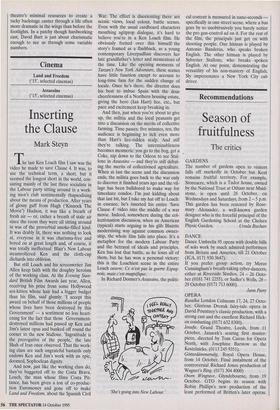Cinema
Land and Freedom (`15', selected cinemas) Assassins (`15', selected cinemas)
Inserting the Clause
Mark Steyn
The last Ken Loach film I saw was the video he made to save Clause 4. It was, to use the technical term, a short, but it seemed the longest short in the world, con- sisting mainly of the last three socialists in the Labour party sitting around in a work- ing men's club sentimentally rhapsodising about the means of production. After years of glossy guff from Hugh (`Kinnock The Movie') Hudson, it was like a breath of fresh air — or, rather a breath of stale air since the room they were all sitting around in was of the proverbial smoke-filled kind. It was drably lit, there was nothing to look at, everyone in it was charisma-free and bored on at great length and, of course, it was totally ineffectual: Blair's New Labour steamrollered Ken and the cloth-cap diehards into oblivion.
But still Loach and his screenwriter Jim Allen keep faith with the doughty heroism of the working class. At the Evening Stan- dard British Film Awards last year, Allen, receiving his prize from some Hollywood sex-kitten whose hair had a bigger budget than his film, said glumly: 'I accept this award on behalf of those millions of people whose lives have been destroyed by this Government' — a sentiment no less heart- ening for the fact that those Government- destroyed millions had passed up Ken and Jim's latest opus and bunked off round the corner to the new Stallone. 'Ingratitude is the prerogative of the people,' the late Shah of Iran once observed. That the work- ing class are such ungrateful bastards only endows Ken and Jim's work with an epic, doomed, Sophoclean dignity.
And now, just like the working class do, they've buggered off to the Costa Brava. Loach, the man whose films Costa Pit- tance, has been given a ton of co-produc- tion Euromoney and gone off to make Land and Freedom, about the Spanish Civil War. The effect is disorienting: there are scenic views, local colour, battle scenes. Even with the usual cardboard characters mouthing agitprop dialogue, it's hard to believe you're in a Ken Loach film. He obviously fretted over this himself: the story's framed as a flashback, as a young contemporary Liverpudlian discovers her late grandfather's letter and mementoes of the time. Like the opening moments of Tarzan's New York Adventure, these scenes have little function except to account to long-time fans for the sudden change of locale. Once he's there, the director does his best to imbue Spain with the dour cheerlessness of a Northern housing estate, giving the hero (Ian Hart) lice, etc., but pace and excitement keep breaking in.
And then, just when you're about to give up, the militia and the local peasants get into a discussion on the merits of collective farming. Time passes: five minutes, ten, the audience is beginning to itch even more than Hart's lice-ridden scalp. And still they're talking. The interminableness becomes mesmeric: you go to the bog, get a Coke, nip down to the Odeon to see Stal- lone in Assassins — and they're still debat- ing the merits of collectivised agriculture. When at last the scene and the discussion ends, the militia goes back to the war only to discover it finished years ago and the vil- lage has been bulldozed to make way for timeshare condos. I'm just kidding about that last bit, but I take my hat off to Loach: in essence, he's inserted his entire 'Save Clause 4' video into the middle of a war movie. Indeed, somewhere during the col- lectivisation discussion, when an American (typical) starts arguing in his glib Blairite modernising way against common owner- ship, the whole film falls into place. It's a metaphor for the modern Labour Party and the betrayal of ideals and principles. Ken has lost that battle, as he loses all of them, but he has won a personal victory: this is the Loachiest scene in the entire Loach oeuvre. Ce n'est pas la guerre Espag- nole, mais c'est magnifique.
In Richard Donner's Assassins, the politi- `She's going into New Labour.' cal content is measured in nano-seconds specifically in one street scene, where a bus goes by so unobtrusively you barely notice the pro gun-control ad on it. For the rest of the film, the principals just get on with shooting people. One hitman is played by Antonio Banderas, who speaks broken English. The other hitman is played by Sylvester Stallone, who breaks spoken English. At one point, demonstrating the versatility of his non-mastery of English, Sly impersonates a New York City cab driver.










































































 Previous page
Previous page